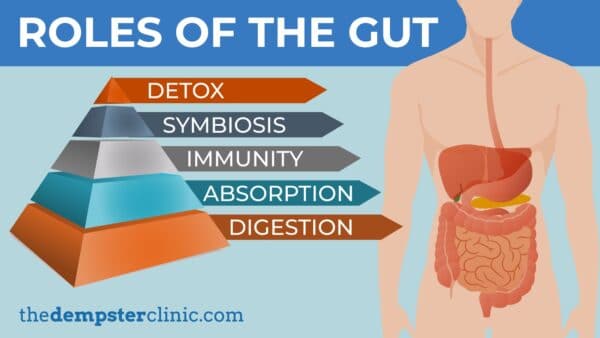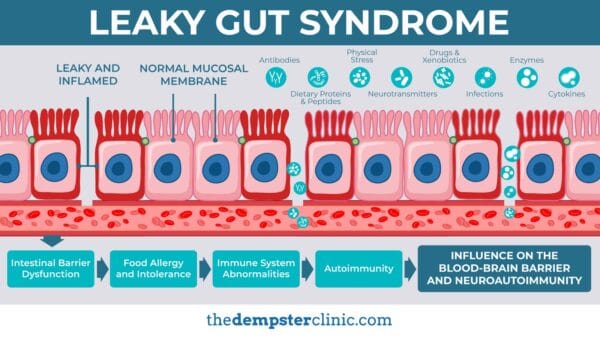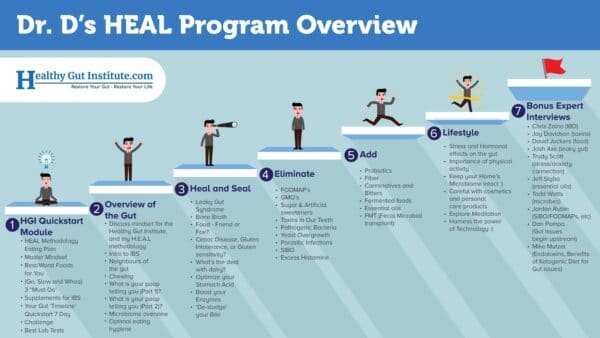When it comes to certain body ailments, many people treat their symptoms at surface level. With functional medicine, however, we look at the body as a whole and strive to get to the root of the problem. We realize that certain symptoms are simply an indicator of something going on much deeper within the body.
The GI tract is a complex system that plays a major role in caring for the body. Most people assume that an unhealthy gut means improper digestion that can lead to gas, bloating, diarrhea, or constipation. And, while that is true, not all gut issues are related to poor digestion. For example, that acne you can’t seem to get rid of may not be indicative of needing a new face wash, it could actually mean your GI microbiome is severely imbalanced.
The Role of the Gut

When we consider the GI tract, we often think of one long system which takes food in, digests it and then excretes it. And, while that is one part of this complex system, it really is critical to overall health of the body.
The GI tract works to perform digestion, absorption of nutrients, and excretion of waste. Not only does it provide your body with the energy and nutrients you need, it influences the development and function of the immune system and can even impact gut-brain communications. In fact, many believe there is a direct link between overall health and well-being and the development of a healthy GI tract.
The Microbiome
One of the reasons this body system is so proficient at digestion and absorption is because it houses trillions of microorganisms made up of bacteria, fungi, viruses, and other life forms, known as the gut flora or microbiome.
Bacteria alone can have about 300-500 different species in the digestive tract with most of it considered to be both good and beneficial. Having a wide variety of good bacteria can not only keep this system healthy, but can also help improve mood symptoms like depression, enhance the function of the immune system, and even help fight obesity.
Signs of an Unhealthy Gut

While damage to the gut can be caused by poor eating habits like eating processed, high sugar foods, it can also be caused by a lack of sleep and chronic stress. Though poor digestion is certainly a manifestation of an unhealthy GI tract, it can also manifest in several other ways:
1. Skin
Common skin conditions like eczema, acne, and psoriasis are all believed to be linked to a damaged gut. Inflammation in the GI tract from the lack of a nutritious diet or even allergies can cause an increase in leaking and therefore the releasing certain proteins into the body. These proteins are believed to irritate the skin and cause several harmful conditions.
2. Joint Pain
When an imbalance in microflora in the GI tract becomes an issue, inflammation can spread to the entire body. Often this is caused, again, by harmful substances leaking from this complex system and passing into circulation. These substances can then travel to tendons, muscles, and joints causing both inflammation and pain.
3. Low Energy and Fatigue
Another issue that results from an imbalance in the microbiome is low energy and fatigue. An unhealthy gut can have a negative impact on your circadian rhythm which disrupts sleep and can leave you feeling tired throughout the day.
4. Brain Fog
While most people don’t realize it, the GI tract actually produces neurotransmitters that are linked to thoughts, moods, concentration, and other cognitive abilities. If dysbiosis occurs, inflammatory reactions may occur leading to a negative impact on both memory and learning.
5. Anxiety and Depression
As mentioned, there is a definitive link between both the GI tract and the brain. Therefore, disturbances leading to inflammation in the central nervous system is actually linked to issues like anxiety and depression.
It is believed that about half of the dopamine found in the body and the majority of serotonin are produced in this system. If this system is compromised, these “happy hormones” will be affected leading to poor mood or a depressed state. Furthermore, a leaky gut could cause these hormones to be lost or “leaked” rather than used properly.
6. Autoimmunity
With the systemic inflammation that can occur from an unhealthy GI tract, the functioning of the immune system can alter. This can lead to several autoimmune diseases where the body will, rather than demolish harmful invaders, go after itself. These conditions include rheumatoid arthritis, multiple sclerosis, ulcerative colitis, and many others. Gluten is known to be a major contributor of leaky gut which, again, can be a factor for autoimmune issues.
Ways to Improve Gut Health
Though poor gut health can have devastating effects on your health and everyday life, improving it can be simple. Implementing the following lifestyle changes can make all the difference in your health and wellbeing:
- Getting Sleep – Strive to get 7-8 hours of uninterrupted sleep every night. A lack of sleep or poor quality sleep can greatly impact the health of your GI tract and other systems in the body.
- Lowering Stress Levels – Chronic stress is extremely taxing on the body. Try incorporating things like meditation, exercise, essential oils, spending time with loved ones or pets, and eliminate excessive caffeine.
- Staying Hydrated – Aim to drink plenty of water as this can keep good bacteria balanced and can positively affect the mucosal lining of the intestines.
- Incorporating a Prebiotic or Probiotic – These supplements, when from a high quality, reputable source, support gut health. A prebiotic provides food for the growth of beneficial bacteria, while probiotics are live forms of good bacteria.
- Checking for Food Intolerances – Cramping, bloating, diarrhea, rashes, nausea, fatigue, and even acid reflux are all signs you could have a food intolerance. Try eliminating well-known trigger foods to see if symptoms improve.
- Changing the Diet – Work to eliminate processed, high sugar foods and instead turn to lean proteins and plant-based foods that are high in fiber.

Consider a Discovery Session
If you are dealing with one or several of these issues it may be time to consider the health of your gut. Schedule your complimentary discovery session with The Dempster Clinic today for a time to meet with Dr. Dempster to discuss your symptoms and how his methods can help. Simply sign up online and one of our team members will schedule your appointment shortly!


